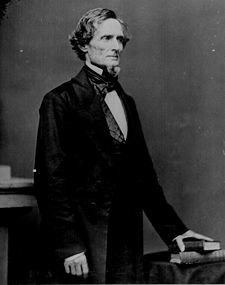| << Chapter < Page | Chapter >> Page > |
Jefferson Davis (1808-1889) led a varied career, indicative of the controversial place he occupies within United States history. He spent his early adulthood in the U.S. military, then years later drummed up a volunteer force to fight in the Mexican-American War. After the war, he settled on a life in politics. In his first attempt, he was elected to the U.S. congress as a senator from Mississippi. He served for a brief period as the Secretary of War under Franklin Pierce; when his term ended in 1857, he returned to his seat in the Senate. In the years leading up to the Civil War, he actually opposed secession and fought hard for a compromise to ensure the integrity of the Union. When he learned of Mississippi’s decision to secede, however, Davis returned home and was promptly elected to a six-year term as the first (and only) President of the Confederate States of America. After the Confederacy’s defeat, he was banned from ever holding political office, yet he was lionized in the South for the remainder of his life. While the nation at large officially branded him a traitor, an entire region continued to deem him a hero. Today, many schools throughout the South are named in his honor. The ambiguity surrounding Davis’s legacy ties into the social and political fissures within the U.S. that have formed historically along the lines of race and region.
Jefferson davis

The ‘Our Americas’ Archive Partnership – a collection of primary documents dedicated to the study of inter-American cultural and historical relations – possesses a set of rare and unpublished letters authored by Davis. Held at Rice University’s Woodson Research Center, which also contains other materials by and about Davis (including a clothing order on his behalf), these letters can be broken down into three chronological periods: a pre-Civil War era that sees Davis as a functionary of the U.S. government (four letters), Davis’s presidency during the Civil War (two letters), and a brief period at the very end of Davis’s life (two letters). These documents form a remarkable, if microscopic, arch to his life and career and will be of great value to the scholar and student alike interested in Davis’s biography. This module will offer a brief overview of each timeframe as well as some of the letters contained therein. For a more detailed examination of Davis and his historical context, see William Davis’s Jefferson Davis: The Man and His Hour and George Rable’s The Confederate Republic: A Revolution against Politics . One can find the majority of his published writings in The Papers of Jefferson Davis , edited by Haskell Monroe, James McIntosh, and Lynda Crist.
The earliest letter in the archive dates from December 10, 1846 . It is written from Davis to his wife, Varina “Winnie” Davis, during his time spent fighting in the Mexican-American War. This document offers dual insights into both his early military career and his personal/family life. He describes for his wife the movements of Santa Anna and the Mexican Army, then tells her about another military wife in New Orleans to whom he would like to introduce her. The remaining letters in the pre-Civil War timeframe come from the 1850s, while Davis was serving as an elected official in the federal government. All of them find Davis either recommending or agreeing to recommend someone for a post in the U.S. military. Here we are left to conclude that his opinion was a valued one, especially on military matters, an assumption which is borne out, of course, by his aforementioned position within the War Department under President Pierce.

Notification Switch
Would you like to follow the 'Revolution and war in the hemisphere' conversation and receive update notifications?